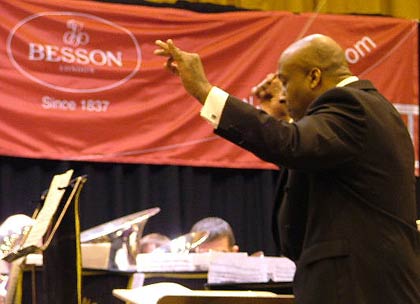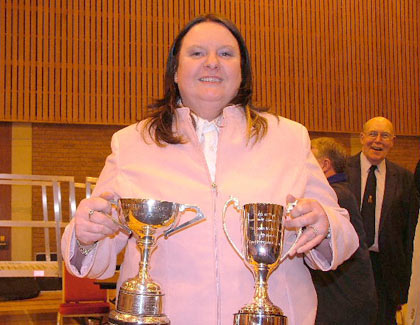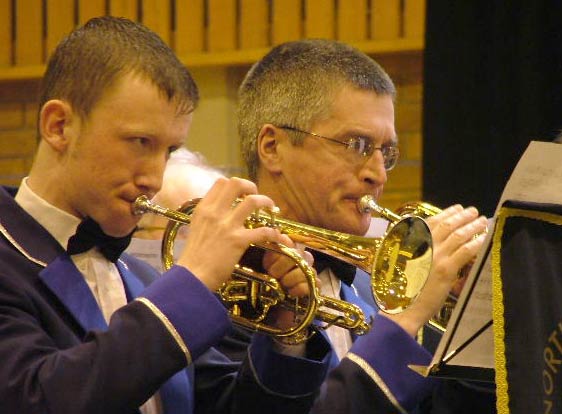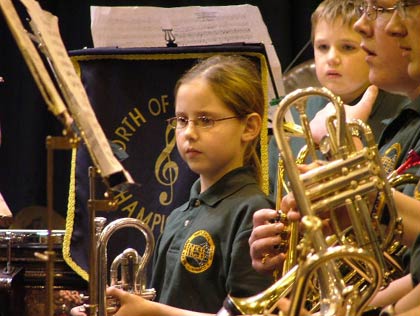2005 Regionals: North of England - Retrospective: Fourth Section
1-Mar-2005The bands here found life difficult trying to master Divertimento, but in the end it was Five Rivers who came out on top.
To be a little blunt about it, the standard of playing in the Fourth Section here was not very good.
Adjudicator, Derek Broadbent was being very generous when he said that the bands had ‘acquitted themselves quite well' – but you got the feeling that if that was ‘quite well', what on earth would he have had to say if he felt that the playing was merely adequate?
It was difficult though to find fault with the efforts of the eight bands here, for they all tried their best (and made the effort to come to contest when others didn't), but the test piece certainly proved to be a very stern test indeed for them all, and each of them were found wanting to some degree or another – and for some it was almost third degree murder.
The winners though, Five Rivers Brass were good value for their win against the others in this field, but you wonder if the level of performance they produced here in taking the £200 top prize and the Northern Region Challenge Tribute Trophy would find its way into the prize list come the Finals in Harrogate. Not probably likely on this evidence.

Five Rivers Brass MD Duncan Beckley
Conducted by Duncan Beckley in open necked shirt, and chewing a wad of gum the size of a small house, Five Rivers produced the most consistent performance of the day of the four movements of Bryan Kelly's ‘Divertimento' which brought praise from Derek Broadbent and gave them a clear two point winning margin from Dunston Silver in second place, with Durham Constabulary a couple of points further back in third.
Duncan is one of the most experienced MDs at this level and has the happy knack of producing winning performances from the bands he directs. This was no exception, and it certainly had its moments when the balance and sound of the band was a class above the rest of the field. There was however a whole litany of little errors and careless blips which robbed the overall picture of clarity and these will certainly need to be eradicated if they are to feature come Harrogate in September.

Five Rivers Brass: Theresa Harris, Best Principal Cornet
One player though who was exempt from this was the Principal Cornet, Teresa Harris, who produced a wonderful clear and warm cornet tone throughout the performance to take home with her the inaugural Stan Morris Cup for the ‘Best Principal Cornet Player' on the day.
The award was being made this year by Pat Price, who was the daughter of the late Stan Morris who died a year ago just before the 2004 contest. It was a lovely gesture for her to give the prize on behalf of a man who gave so much to the banding movement in the North East, and the winner certainly deserved the prize and the plaudits for her efforts on a difficult piece.
Teresa has been with the band for over 25 years now, and up until a year ago was playing soprano cornet. She changed over to the top chair and on a piece which she described as ‘really enjoyable' Teresa led her band with real aplomb and authority. It also means that for the first time in her long career she will be playing at the National Finals. No wonder she looked close to tears when we spoke to her.
Five Rivers were the fifth of the eight bands to take to the stage here at the Dolphin Centre in Darlington, and the four that preceded them didn't really do themselves or the music justice.
Durham Constabulary conducted by Ken MacDonald were the band drawn number 1 on the day, and put up a decent effort on the piece that started so well, but then began to fade away through the remaining three movements. It certainly was a performance that took its time to get going – in fact 15 minutes, as the noise from the roller blade disco in the downstairs hall at the Centre intruded into the main hall upstairs and meant that things couldn't start unless the bands wanted to play to the accompaniment of teenage screams and drum ‘n bass thumping out. In the end though the band waited patiently for things to be turned down and went out and came third - but that was perhaps more to do with the standard of the performances of others, rather than the standard of the performance they delivered.
Following them on were Bearpark and Esh conducted by A. Hall, who were another band that started well but then lost their sense of style and more importantly, rhythm.
This was the main point that was made by Derek Broadbent in his intelligent remarks at the conclusion of the playing. Here he made the telling point that although ‘Divertimento' was written over 30 years ago, and was a difficult enough piece back then when it was used as the set work for the National Second Section Finals, those difficulties hadn't gone away in the intervening years: And one of those difficulties was the question of rhythm – or ‘lack of it' as he remarked here.
It is difficult to criticise bands, and especially the players at this level for their efforts in performing a difficult work such as this, but it should not exempt the conductors from being criticised for not being able to recognise that far too often their players were playing completely the wrong rhythms in too many places. A case in point was the soprano cornet line written just before rehearsal letter D in the ‘Intermezzo'. Was it really too difficult for the MD to point out to their players that they were in fact playing a triplet rhythm instead of a bar and a half of dotted quavers, semi quavers? This is very basic stuff indeed and the MDs who allowed it should take the blame – it was criminally lax of them and allows young (and many older) players to ingrain bad habits into their playing that will then become nigh on impossible to eradicate in years to come.
Bearpark and Esh were culpable of such errors, but led by a fine Principal Cornet who rarely took the instrument from his lips (the band didn't have soprano cornet player, and he cleverly depped the parts) they managed a fair account of the work, that although not a winner, was still good enough to make it to the podium.

Dunston Silver: Cornets
Dunston Silver under A. Seymour followed on and in the final results came out in second place and with a qualification place to boot after giving a robust account that varied in quality but retained the general control of rhythm that was so lacking in others. There was a scary moment for the MD in the first movement when the solo cornets got lost, but they recovered well and put together a performance that deserved its final placing. After many a year when they have been a non contesting band, this is the first time that they have qualified for the Finals and it is a huge boost for the band and their very likeable MD who was a delighted (and slightly squiffy) man when we met up with him later that night in the bar. Well done though – they deserved it.
Barrow Concert followed Dunston on stage and they too gave a performance that had its moments both good and bad. There was some very good euphonium playing and some neat flugel horn work as well, but the last two movements in particular didn't quite match the standard of the first two and we don't think they can complain at their eventual fifth place.
Fiver Rivers then produced the winning performance – a strong and robust account indeed, flawed in many places, but one that was clearly, as in the remarks made by Derek Broadbent that ‘was a small head and shoulders above the rest.'
That was also the high point of the section as a whole, as the remaining bands found it a bit of a struggle to overcome both the technical and musical problems in the test piece.
Trimdon Concert conducted by A. Holmes just didn't quite bring enough consistency to all the four movements and suffered with a few too many nerves around the stand to make a mark, whilst Stanhope started well but had far too many errors in feature.
That performance could be excused a little by the fact that Stuart Robson had been snowed in for most of the week and so couldn't get to rehearsal until Friday night – the weather up here had been pretty severe all week. It meant that there were a few hairy moments, such as the beginning of the second movement in particular, but fair play to them, they battled all the way through to the end.

Hartlepool (Youth and Community)
Finally, the last place at the contest was taken by the debutants, Hartlepool (Youth and Community) Silver who deserved to prop up the table but who also deserved to be given a standing ovation for their efforts.
This was a band of very young youngsters combined with what appeared to be parents, brothers and sisters and friends – all of whom had started playing in the last year or so. The standard was therefore not good – but the effort put into the performance would have made Black Dyke proud. 16 or so players played their hearts out, the MD give as many smiles and winks of encouragement to his players as there were bars in the piece and in the end they made it to the last note – just about together. This was a brilliant effort from everyone concerned – they could have so easily not come and played, but they did, and did themselves proud.
Congratulations therefore to everyone involved with them from the MD, Ian Humbertson right down to the tiny little girl playing third cornet with a seriousness that Philip McCann would have been proud of. Don't worry about the result – this was what brass banding should be all about – enjoying music making.
At the end there was a well deserved presentation made to Ray Evans of the Bearpark and Esh Band from the Company of Worshipful Musicians for a real lifetime of fantastic work developing young players in the North East, before the remarks of Derek Broadbent and the presentations of the prizes.
As Derek summed up, it was impossible not to disagree with him – although he was on best diplomatic form, as this overall wasn't good stuff. There was one performance that stood out from the rest, and two that deserved to take the qualification honours. Whether or not they can make an impression at Harrogate though is an entirely different matter.
Iwan Fox and Malcolm Wood.















